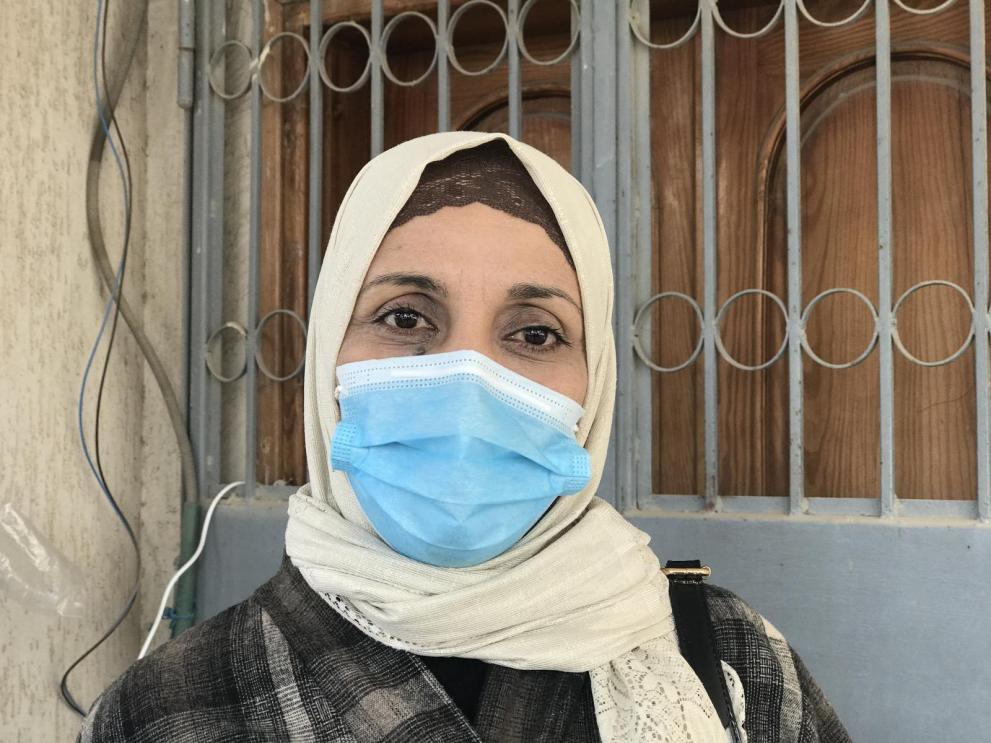
On International Women’s Day, we celebrate the achievements of women, including those who’ve been helping out in the fight against COVID-19.
Women are at the frontlines of the COVID-19 crisis as health care workers, caregivers, community organizers and leaders in fighting the pandemic.
Syrian refugee in Libya, Maha, a mother-of-five, is a community outreach volunteer in Tripoli with UNHCR partner, the International Rescue Committee (IRC), helping other refugees and asylum seekers to understand how to access health services and assistance, providing counselling and follow-ups.
“Before the COVID pandemic, I used to do a lot of home visits, but then everything changed. We turned a lot to social media apps. Slowly, now, we are doing more home visits - that’s important for many people, especially Syrians, who are very social and like to do everything face-to-face.”
“I’ve been a community outreach volunteer with IRC for the past two years. My work mostly involves giving advice and information on where people can get information and access to medical services”.
UNHCR’s partner IRC is providing primary health care to about 43,000 registered refugees and asylum-seekers in Libya at the Community Day Centre in Tripoli and at a number of Primary Health Care Centres (PHCC’s) in several neighborhoods in Tripoli. It runs a community outreach volunteer programme with refugees who help to provide counselling, as well as spreading information more widely about services and assistance provided. IRC also operates a 24/7 medical emergency hotline providing assistance to those in need of urgent care through an ambulance service and referral to specialized clinics. UNHCR’s urban medical programme receives substantial financial support from the European Union Trust Fund for Africa (EUTF).
“This work is very important for me. I feel I can help other people, because of the things I saw and went through in Syria. After that, I said: ‘Any help I can give, I will do’. My husband was supportive. He knew I wanted to do this, to help others. The situation in Libya is difficult, and even harder with COVID; many people don’t have jobs, are suffering and need any help they can get.”
The COVID-19 pandemic further deteriorated the already weak health situation for many refugees and asylum-seekers in Libya. With emergency measures in place to curb the spread of the virus, including movement restrictions and social distancing, access to health services was and continues to be impacted. For this reason, the support provided by community outreach volunteers is more important than ever.
“Of course, I was worried about working during this COVID time, but I never thought about stopping. I took precautions. I wanted to work to help people: I’m a humanitarian”, said Maha.
“Because people had to stay at home due to COVID, we are now seeing more domestic problems; families are having more arguments and there are more frictions. Children are at home all the time, and things get difficult to handle. It impacts on everyone. There are more cases of domestic violence and divorce during this time”, she added. UNHCR’s programme on gender-based violence is providing services for SGBV survivors, while psycho-social services are also provided for individuals and groups, with many sessions taking place online and via the phone.
The COVID-19 pandemic has made daily life in Libya, which was already very-challenging for refugees and asylum-seekers, even harder. Although a ceasefire is in place and security conditions have eased, COVID-19 restrictions have made it harder for people to find casual work, and they are finding it a struggle to pay rent and daily necessities, due to the ongoing liquidity crisis. UNHCR’s emergency food assistance programme, run jointly with WFP, and supported by the EUTF, began last year to provide some support for the most food-insecure when the COVID pandemic first appeared in Libya.
Maha and her outreach volunteer colleagues observe, however, that women are resilient and creative in finding opportunities to support themselves and their families in difficult times – citing examples such as selling home-made crafts or food prepared at home. With the financial support from the EUTF, women like Maha are able to continue to play a vital role in their support of community members by providing information but foremost psychological support well needed during these challenging times.
“On this women’s day, my message to other women is do not to give up. I know their situations are difficult and I see a lot of people who are depressed, who want to stay at home and not do anything. I hope that nothing stops us from pursuing our ambitions. Not a disease or anything. With measures in place, we can prevent it. We don’t want to just sit and wait this virus to end. I advise all women to continue persevering in their daily lives and work. “
Background
The North of Africa window of the EU Emergency Trust Fund for Africa (EUTF Africa) is supporting financially the Community Day Centre in Tripoli and its community outreach volunteer programme. Providing counselling and spreading information about health services and psycho-social assistance for vulnerable people, in particular for women, are part of the core priorities of the EUTF’s protection activities in Libya. The Trust Fund has mobilised so far €455 million in Libya, out which the majority of the funds goes to the protection of the most vulnerable, in particular women and children.
See UNHCR's publication for information too: https://www.facebook.com/UNHCRTripoli/posts/1216382908759338
Details
- Publication date
- 8 March 2021
- Region and Country
- Libya
- Thematic
- Improved migration management
